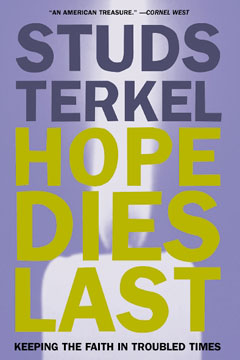 Today's book review is from a guest, our first. The guest is Bea Cotton, a fluffy white Bichon Frise, who has her reviews ghost written by owner Edie Cotton. Both Bea and Edie are great characters that speak the same language — so to speak. Bea woofs in a language called Dogese, which apparently Edie understands and transcribes for us here in her review of Hope Dies Last: Keeping the Faith in Troubled Times by Studs Terkel. Thanks for reading and share your reviews with us by emailing carol doane at gmail.com. Happy Reading!
Today's book review is from a guest, our first. The guest is Bea Cotton, a fluffy white Bichon Frise, who has her reviews ghost written by owner Edie Cotton. Both Bea and Edie are great characters that speak the same language — so to speak. Bea woofs in a language called Dogese, which apparently Edie understands and transcribes for us here in her review of Hope Dies Last: Keeping the Faith in Troubled Times by Studs Terkel. Thanks for reading and share your reviews with us by emailing carol doane at gmail.com. Happy Reading!So, before you beg to differ, I’ll bark off a list of such “somethings,” in case you human readers don’t understand Dogese:
- environmental injustice
- healthcare injustice
- racial injustice
- gender injustice
- housing injustice
- wage injustice
- commodity-over-community injustice
- . . . etc.
So, panting to find some hope, people, I picked up a collection of interviews — with congressmen and cooks, union organizers and CEOs, students, immigrants, activists, veterans, priests and lawyers — constituting the alternative American history of ordinary folks. The long short of it: people can surprise you!
So that’s where I’m going this month with book titles:
Hope Dies Last: Keeping the Faith in Troubled Times by Studs Terkel, 2003, The New Press.
About the author: Studs Terkel, Pulitzer Prize-winning author, wrote searching interviews with ordinary Americans and helped to establish oral history as a serious genre. His “guerrilla journalism” was not, however, an inquisition as an exploration into the past. He died in 2008 and wanted as his epitaph “Curiosity never killed this cat.”
Friskily yours,
Beatrix
Rating: Howling: Woof-Woof-Woof!
Purchase through our affiliate link, and referral fees donated to Woman of Wonder, a college scholarship fund for women.
You may also enjoy, How I got here and why it matters by Carol Doane.



Comments
Post a Comment